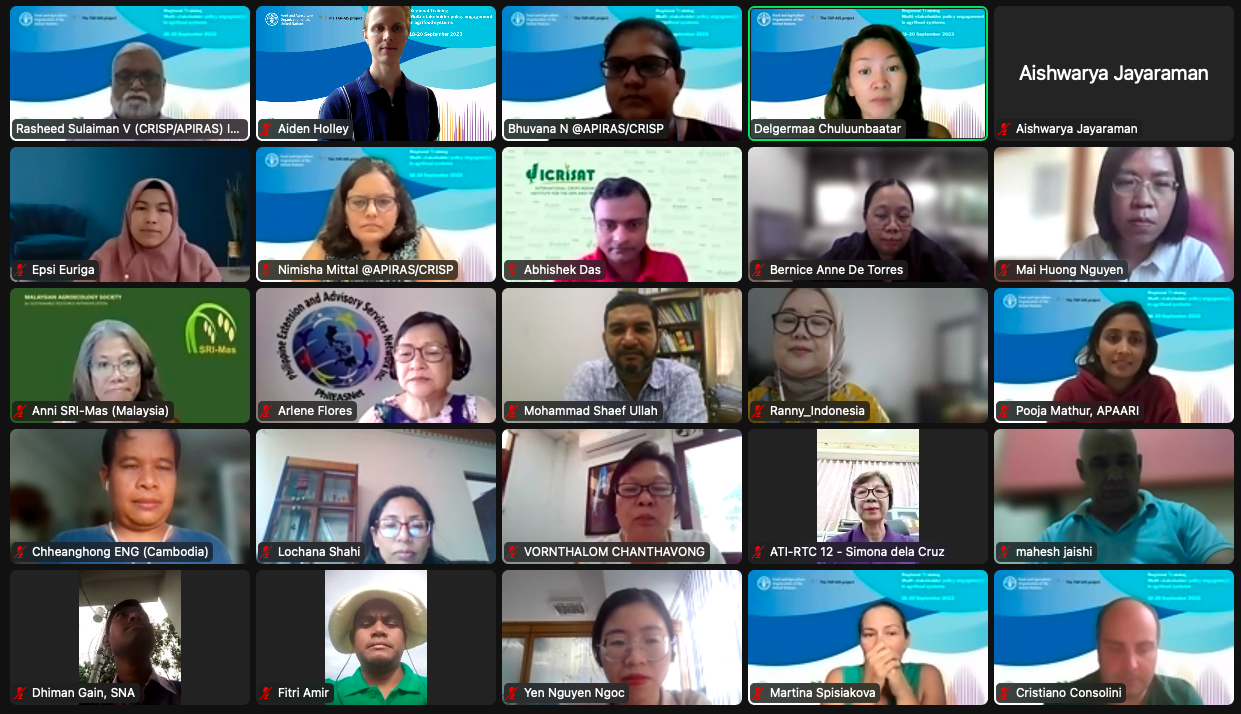FAO’s Office of Innovation, in collaboration with the Asia-Pacific Association of Agricultural Research Institutions (APAARI) and the Asia-Pacific Islands Rural Advisory Services Network (APIRAS), recently organized a regional training (18–20 September) on multistakeholder policy engagement in agrifood systems. This virtual training was designed and implemented within the framework of the EU-funded TAP-AIS project; similar trainings have already been implemented at the national level in six countries (e.g. here and here), but this was the first time the training was adapted to the regional level (Asia-Pacific), targeting government and non-governmental representatives from education, training, research and extension institutions in the agrifood sector.
Strengthening the capacity to engage in strategic and political processes is crucial for stakeholders in agricultural innovation systems (AIS) and is a key component of the TAP-AIS project. This regional training, as well as previous trainings at the national level, have been organized to address this need among key AIS stakeholders.
Twenty-five participants from 13 countries in the Asia-Pacific region attended the training, which aimed to improve their understanding of policy processes in general and provided them with practical tools and approaches for basic analysis of policy issues, negotiation and communication with policy actors, among others.
The agricultural innovation system (AIS) is defined as a network of actors, i.e. organizations and individuals, together with supporting institutions and policies in the agricultural and related sectors that engage in and facilitate innovation.
"When we want to achieve innovation and impact at a scale, enabling policies are critical."
Rasheed Sulaiman V, Focal Point APIRAS
The training commenced with opening remarks by Ravi Khetarpal (Executive Secretary of APAARI) followed by a presentation to set the scene by Rasheed Sulaiman V (Focal Point APIRAS). Both emphasized the importance of policy engagement for promoting innovation in agrifood systems and contributing to the Sustainable Development Goals (SDGs). Yet often, stakeholders in the AIS do not have the necessary capacities and confidence to engage in policy processes.
Following Sulaiman’s presentation, an interactive panel discussion was held with three regional experts with diverse experience in policy engagement. Kalpana Sastry Regulagedda (Managing Director, Agri-Innovation Hub (AgHub), Professor Jayashankar Telangana State Agriculture University (PJTSAU), India), Kodeboyina (KS) Varaprasad (Senior Consultant, APAARI and Project Manager USDA Bangladesh) and Chan Saruth (Undersecretary of State, Ministry of Agriculture, Forestry and Fisheries, Cambodia) shared their experiences and advice on how to engage successfully in and influence policy processes.
The training days were highly interactive, with most of the time spent on exercises and discussion. The training followed a logical flow, including 1) Framing and analyzing relevant problems in a political context, 2) Identification and analysis of relevant stakeholders around prioritized problem(s), 3) Communication and negotiation with relevant stakeholders (policy actors), 4) The evidence-based policy brief as a key tool, and 5) The way forward.
The training integrated evidence, tools and approaches from the knowledge networks of FAO, APAARI, APIRAS and others. Many participants expressed particular interest in FAO’s basic framework for governance analysis, which provides guidance on problem framing, among other important steps in governance analysis, and is presented in a recent publication.

Training participants and facilitators on the final day of the virtual training
At the end of the training, many participants shared their plans for how they will use the knowledge and tools from the training in their upcoming work. For example, several participants indicated that they would plan multistakeholder policy dialogues and write policy briefs in their respective areas of work on micro-watershed restoration in Bangladesh and on promoting pollinator biodiversity in Nepal. Many participants also indicated that they plan to organize trainings on policy engagement to teach their respective colleagues, students, etc.
Overall, the training was successful in strengthening participants’ capacity to engage in policy processes. Surveys conducted pre- and post-training show that participants’ self-assessed capacity (measured using multiple rating questions on a Likert scale from 1 to 5 on key skills related to policy engagement) increased on average by 27 percent.
To maintain and further develop this key capacity, the organizing team from FAO, APAARI and APIRAS will follow up in the coming months with training participants. Thus, FAO’s Office of Innovation, through its TAP-AIS project, is fostering a regional network of stakeholders in AIS with the motivation and tools to engage in policy processes in an inclusive, evidence-based manner. This network and its ripple effects will contribute to better policy decision-making for the sustainable transformation of agrifood systems.
